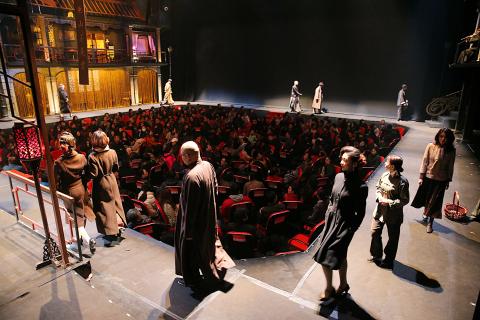Stan Lai’s (賴聲川) widely acclaimed A Dream Like A Dream (如夢之夢), a major landmark in Chinese-language theater, will take the stage at Taipei’s National Theater from Aug. 19 to Sept. 1.
First staged in Taiwan and Hong Kong in 2002, the epic eight-hour production has returned with a new cast, and features actors Chin Shih-chieh (金士傑), Hsu Yen-ling (徐堰鈴), Hu Ge (胡歌) and Chinese pop star Chris Lee (李宇春). Thirty actors will portray over 100 roles in the show. Oscar-winning designer Tim Yip (葉錦添) created the design for the 300-plus costumes.
Epic, romantic, extravagant, metaphysical and engrossing, Lai’s masterpiece will run for a total of eight shows. The production will have no subtitles.

Photo courtesy of Performance Workshop theater
“This story is about life and people’s choices,” Lai told the Taipei Times in an interview in June. “It’s essentially about karma.”
The plotline tells several interwoven stories with one leading to another. The narrative follows the life of Gu Shiang-lan, who lived through much of the 20th century, first as a prostitute in 1930s Shanghai and then, after marrying an aristocrat, a painter in Paris. Following the death of her husband, she returns to China in the 1950s and experiences the Cultural Revolution.
Lai said he drew on the Tibetan Book of the Dead, Tiananmen Square massacre and the Cultural Revolution to craft the emotionally complex story.
“The story moves ahead in time while referring to the past constantly, thus forming a unified whole,” Lai said.
To best present this complex story about love, life and enlightenment, Lai conceived a daunting 360-degree, two-story circular stage that surrounds the audience, who sit in the center pool section. Actors perform on the circular stage, sometimes with two or three actors for the same role appearing simultaneously.
“This story came to me organically, “ Lai said, adding that he thought up the story while attending a seminar in India in 1999. During a meditation session in front of the lotus tree where the Buddha is said to have attained enlightenment, the inspiration surged into Lai’s mind and he quickly scribbled down the plotline. “When you fall into the spell of this show, you won’t feel the length at all,” Lai said of the play’s length.
The performance is divided into two parts and scheduling allows audience members to watch it on two consecutive nights or both parts at the same time.

Taiwan has next to no political engagement in Myanmar, either with the ruling military junta nor the dozens of armed groups who’ve in the last five years taken over around two-thirds of the nation’s territory in a sprawling, patchwork civil war. But early last month, the leader of one relatively minor Burmese revolutionary faction, General Nerdah Bomya, who is also an alleged war criminal, made a low key visit to Taipei, where he met with a member of President William Lai’s (賴清德) staff, a retired Taiwanese military official and several academics. “I feel like Taiwan is a good example of

March 2 to March 8 Gunfire rang out along the shore of the frontline island of Lieyu (烈嶼) on a foggy afternoon on March 7, 1987. By the time it was over, about 20 unarmed Vietnamese refugees — men, women, elderly and children — were dead. They were hastily buried, followed by decades of silence. Months later, opposition politicians and journalists tried to uncover what had happened, but conflicting accounts only deepened the confusion. One version suggested that government troops had mistakenly killed their own operatives attempting to return home from Vietnam. The military maintained that the

Taipei Mayor Chiang Wan-an (蔣萬安) announced last week a city policy to get businesses to reduce working hours to seven hours per day for employees with children 12 and under at home. The city promised to subsidize 80 percent of the employees’ wage loss. Taipei can do this, since the Celestial Dragon Kingdom (天龍國), as it is sardonically known to the denizens of Taiwan’s less fortunate regions, has an outsize grip on the government budget. Like most subsidies, this will likely have little effect on Taiwan’s catastrophic birth rates, though it may be a relief to the shrinking number of

Since its formation almost 15 years ago, Kaohsiung rock band Elephant Gym (大象體操) has shattered every assumption about contemporary popular music, and their story is now on screen in a documentary titled More Real Than Dreams. It’s an unlikely success story that says a lot about young people in Taiwan — and beyond. For a start, their sound is analog. In the film, guitarist Tell Chang (張凱翔) proudly says: “There is no AI in our sound.” His sister, bass player KT Chang (張凱婷) is the true frontwoman — less for her singing abilities than for her thunderous sound on the instrument. Fast like